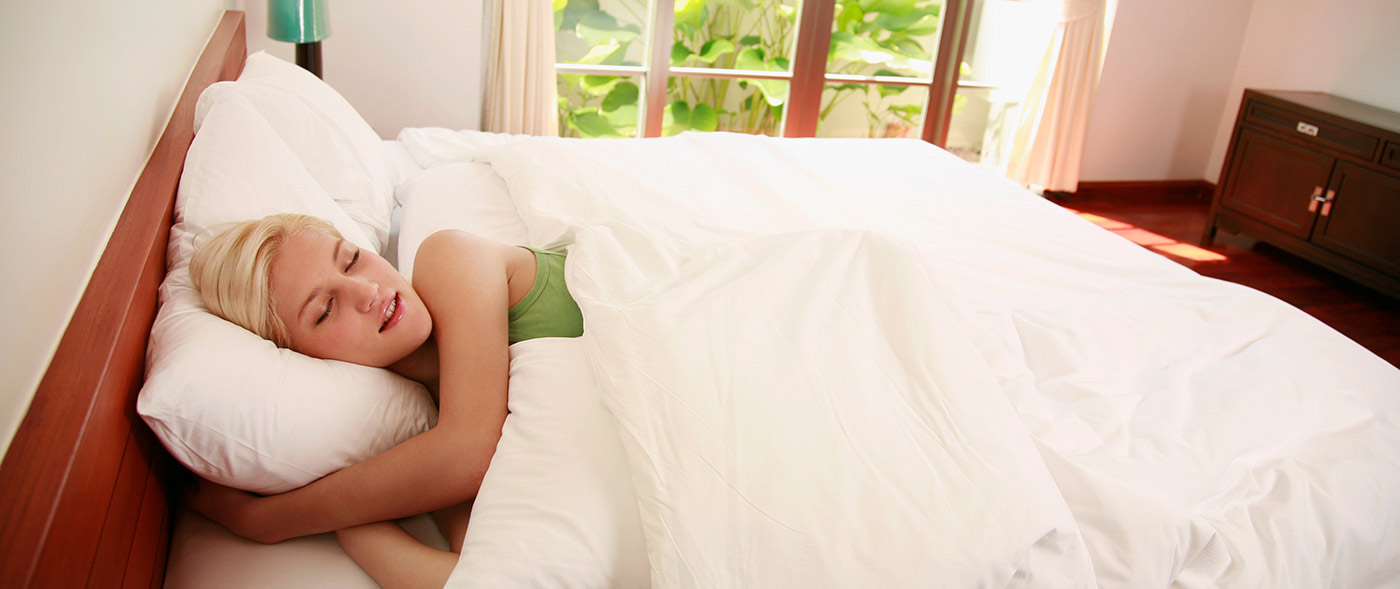The lack of good quality sleep takes its toll on day-to-day life affecting energy levels, weight management and emotional balance.The key to getting a good night’s sleep lies in a consistent daily routine. What we do each day dictates how well we sleep.
Our tips for a better nights sleep
- Consistent bedtime routine -The human body has a natural rhythm that can easily be disrupted by stress, illness or poor diet. To help the mind and body heal together, it is important to ensure you don’t tire out easily. Be consistent when sleeping – set aside seven to nine hours of quality rest every night. Be awake at the same time each day; try not to differentiate between weekdays/weekends by more than one hour. If you find you can’t fall asleep at your usual bedtime, leave the bedroom and do something relaxing. Read or listen to soothing music while doing so; go back to bed when tired and try again.
- Healthy diet – Avoid large meals before bed. Eating a heavy meal can cause indigestion, which may keep you up at night. If you must eat before sleeping, try a light snack such as yogurt or cereal. High carbohydrate meals have been shown to increase disturbed sleep patterns and reduce deep sleep. Cut down on caffeine. Caffeinated beverages such as coffee, tea and fizzy drinks can make it harder to fall asleep. If you’re having trouble sleeping, avoid caffeine for at least six hours before bedtime. Avoid alcohol before bed. While a nightcap may help you fall asleep, alcohol can actually disrupt your sleep later in the night. If you’re having trouble sleeping, avoid alcohol for at least four hours before going to bed.

- Exercise to improve your sleep -One of the best ways to improve your health and help you sleep better is through regular exercise. Exercise can help regulate your body’s sleep patterns and improve the quality of your sleep. It can also reduce stress and anxiety, which can interfere with sleep. If you’re new to exercise, start slowly and gradually increase the amount of time you’re active each week. A good goal is at least 30 minutes of moderate-intensity aerobic activity on most days of the week, such as walking, swimming and cycling. Mind and body wellbeing apps, such as Revoola, can help you. Once you’ve established a regular exercise routine, you can try some specific exercises to help improve your sleep. For example, yoga or tai chi are both excellent forms of exercise for promoting sleep. For a better nights sleep, other exercises that may help include gentle stretching, deep breathing and meditation. Try to avoid exercising too close to bedtime, as this can make it harder to fall asleep.

- Create a soothing and comfortable sleeping environment – To create a comfortable and relaxing sleeping environment, there are a few important things to keep in mind. The bedroom should be dark, quiet, and cool – around 65 degrees Fahrenheit is ideal. Make sure the bed is comfortable, with fresh sheets and plenty of pillows. And finally, ban all electronic screens from the bedroom – that means no TV, laptop, or smartphone use in the hours leading up to sleep. By following these simple tips, you can create a sleeping environment that will help you get the restful night’s sleep you deserve. It is important to find what works for you. Some people prefer to sleep in complete darkness while others might like a dim light or noise machine to help them fall asleep. Experiment with different sleeping environments and find the one that helps you relax best. Just as you would create a calm and relaxing atmosphere to meditate or do yoga in, it’s important to cultivate the same kind of energy in your bedroom to promote deep and restful sleep.

- Relax and clear your mind – Relax and clear your mind to help your sleeping routine . It might be helpful to establish a bed-time ritual that signals to your mind and body that it’s time to wind down for the night. This could involve taking a warm bath, reading a book, or writing in a journal. Taking some time to relax and clear your mind before bed will help you sleep better and reap the benefits of a good night’s sleep.
- Increase your exposure to bright light during the day – Your body has a natural time-keeping clock known as your circadian rhythm .This clock is regulated by exposure to light, with bright light during the day helping to keep you alert and awake. Exposure to natural sunlight or artificial bright light during the day can help to improve your sleep at night. Reduce blue light exposure before bed. Blue light is a type of light that is emitted from electronic screens such as TVs, laptops, and smartphones. This type of light can disrupt your body’s natural sleep-wake cycle and make it harder to fall asleep at night.
Sleep plays a vital role in your physical and mental wellbeing. If you’re not sure where to start, Revoola’s sleep meditations are an ideal way to help you drift off, have a great nights sleep and discover a happier healthier you.
